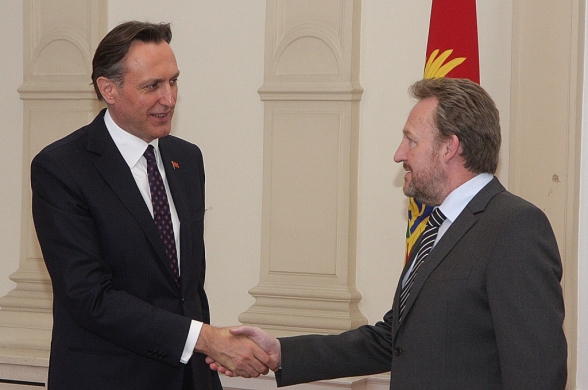President of the OSCE Parliamentary Assembly and Parliament of Montenegro Mr Ranko Krivokapić is paying a visit to Bosnia and Herzegovina, where he has met the highest state officials of the country.
Mr Krivokapić met Chair of Bosnia and Herzegovina Presidency Mr Bakir Izetbegović, Chair of the Council of Ministers of Bosnia and Herzegovina Mr Vjekoslav Bevanda, Minister of Foreign Affairs Mr Zlatko Lagumdžija, leadership of both houses of the Parliamentary Assembly of BiH and Ambassador Mr Fletcher Barton, Head of the OSCE Mission to BiH, in Sarajevo earlier today.
At the meeting with Chair of Bosnia and Herzegovina Presidency Mr Bakir Izetbegović, the sides emphasised that good neighbourly relations between Montenegro and Bosnia and Herzegovina represented an extraordinary baseline for the cooperation that has already existed in the field of economy and tourism – which should be additionally developed in the field of infrastructural investments in order to help the competitiveness of the region as a whole.
Mr Krivokapić and Mr Bevanda spoke on cooperation in the field of European integrations as well as on significance of constructing the Adriatic-Ionian highway for the whole region, which would open new possibilities for improving economic, tourist and trade potentials of both countries. During the meeting, the interlocutors also emphasised the importance of finalising the activities on establishing border line between BiH and Montenegro in length of 700 meters, which would resolve the issue of delimitation of the two states.
During the conversation with Minister of Foreign Affairs Mr Zlatko Lagumdžija, Mr Krivokapić said that current positive atmosphere in the region - which he was able to see during his election to the function of the OSCE Parliamentary Assembly President – was being helpful for the region in order to overview in a better and more comprehensive way the processes which lead to European future of the Western Balkans. Mr Krivokapić initiated, at the meeting, the joint intensifying of the support to the region, particularly to Bosnia and Herzegovina, at the following ministerial council in Thessaloniki, by which 11 years of defining the Thessaloniki Agenda, as a key document for membership of Balkan states to the EU, will be marked.
Meeting with members of collegiums of the House of Representatives and House of Peoples was an opportunity for analysing the current moment for parliamentary diplomacy in the region, when the participants also discussed the importance of power that legislative branch had over the executive branch for the purpose of faster democratisation and post-transition societies.
Krivokapić used his visit to Sarajevo to address MPs of the NATO Parliamentary Assembly at the Rose Roth Seminar titled: “Security and democratisation in the Western Balkans: Anchoring stability and encouraging reforms”.
At the gathering, attended by MPs, representative of the civil sector, representatives of the regional countries and organisations dealing with this issue, Mr Krivokapić said: “The issue of security, however, is still burning in South East Europe. Threats to nowadays security are however different from those that led to tragic conflicts, but by no means less real. Today the key to security in the region is in full and consistent genuine democratisation of our societies, countries and institutions.The first and the most obvious threat to security in South East Europe is organised crime and corruption”.
“Fight against corruption and organised crime must not be understood as a homework that we need to complete, in order to become, one day, a part of the European Union. The fight against these occurrences has to be a result of our true cognition that law and justice should be a cornerstone of our society, our lives and our overall worldviews. If contrary, the fight against corruption and organised crime is sentenced to failure”, Mr Krivokapić stressed in his addressing.









